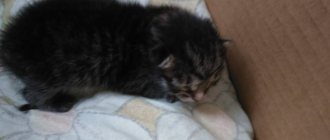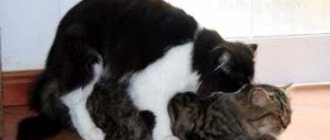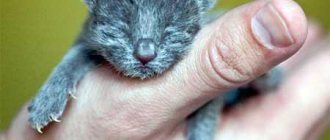Whether kittens miss their mother is usually of interest to those owners who have begun to notice excited behavior in the kitten. Anxiety affects the nervous system of both the baby and everyone in the household. Requiring close attention, the kitten is trying to get the missing warmth from its mother, so try to spend as much time with it as possible.
If you want to help him, the main thing is not to harm him. After all, constant physical contact (for example, from a child) can cause stress in a cat of any age. Trying to get him out of the corners of the apartment, where he tries to hide, know that he is doing this for a reason, it means he is calmer this way, he needs to adapt to the new housing. As night approaches, kittens will be more active, as they prefer dark environments.
The kitten misses its mother: what to do
Rarely do people want to adopt an adult animal.
Yes, and this is understandable. Purrs find it difficult to adapt to a new place of residence, but an adult already has its own habits. Cats are very smart animals. However, some may begin to take revenge without even realizing that the person is saving them from an unenviable life on the street. There are often cases where people are thrown away, even purebred ones. At a new place of residence, an adult can sharpen its claws on an expensive sofa, pee in shoes or on the bed, scream loudly all night and keep the owners awake.
Some subjects may sit under a bathtub or other secluded place for a month out of fear. It is especially difficult if the animal is not sterilized. It will definitely be asked to go outside. Well, you can’t do anything against the instinct of nature.
It is necessary to carry out sterilization as quickly as possible, be patient and try to establish contact with the animal. It is worth remembering that anyone can be tamed, but it is difficult to change their character. It is easier to get along with the cubs, as well as raise them.
Obvious reasons
Meowing of varying degrees of volume, and sometimes frankly persistent yelling, can be heard at any time of the day: in the middle of the night, early in the morning or during the day. And if for oriental breeds such behavior is considered within the norm, then for other cats it is a signal that something is bothering them.
The cat meows and asks for a cat
Hormones. This is the first thing that may come to mind when a cat that has left childhood begins to bother you with its frequent meows. Absolutely all mature, non-sterilized cats, as well as non-castrated cats, behave this way. Not only psychological, but also physical discomfort is caused by the lack of opportunity to have offspring.
In addition, a loud cry is a signal to individuals of the opposite sex that they are ready to mate. Such “concerts” will be repeated regularly, and when adopting a kitten, you should immediately decide for yourself whether you will sterilize it, or will have to put up with loud meowing and patiently wait for the end of the difficult period.
The cat does not leave the owner due to attention deficit
Cats, like all animals, love affection.
Attention deficit
Sometimes cats may meow in hopes of attracting the attention of their owners. They quickly begin to understand that people immediately react to loud sounds, and thus try to achieve what they want, most often - some favorite treat
But it happens that a cat is forced to spend most of the day at home alone, and when his beloved owners meet, he begins to meow loudly
In this case, it is enough to simply pay attention to him: play, pet him, communicate affectionately, honor him behind the ear. If your pet is left alone for a long time, you should provide him with food and toys so that he has something to occupy himself with.
What to do if a kitten misses its mother
This phenomenon rarely occurs, especially if you pick up the baby when he has already begun to eat everything and does not really need milk. It is much easier to tame a cub and get along with it. At first glance, when the baby is sad and not playful, you might think that the kitten misses the cat's mother. However, he may be hungry or cold.
If you really want to become a friend to your pet, warm it up, feed it, and cuddle it. This way you can replace his mother, gain trust and affection, raise an affectionate animal with whom you will enjoy spending time.
If this doesn't help, the kitten misses its mom and you don't know what to do. In this case, try to distract him with some kind of toy. Purrs are predators by nature; they rush at small moving objects. You can even play with the animal with an ordinary cord. Buy a tennis ball. There are other devices available in pet stores. Kids, and adults too, especially like scratching posts with balls on a string. This way you can train your claws to sharpen in the right place from childhood.
If you feel sorry that the kitten misses its mother, pair it with a brother or sister. Together they will be much more fun and not bored. And you will have one more friend. In addition, you don’t have to worry that the animals won’t get along with each other. Cubs from the same litter are accustomed to sleeping in an embrace and eating from the same bowl. Such habits will remain for life.
Don’t worry about the fact that keeping two animals is doubly expensive. Believe me, one animal picks at its food, and when there is a competitor, it will eat everything like a little one. If you don’t have the money to buy a second purebred animal, perhaps you should just give a roof over your head to street kids from a shelter. They will be grateful to you for the rest of their lives. These cats require less care. And anyway, who buys friends for themselves?
Source
Coexistence between animals in different conditions
Often, for example, among breeders, several generations of cats of different levels of kinship live peacefully with each other and do not share resources. In the wild, cats try to stay together in a pack, in which the smartest and most mature females rule. They perceive their matured sons as low-ranking males, and try not to mate with them - related genes can lead to harmful mutations. “Young people” live for the most part with their parents. The flock drives away strangers as competitors for resources at all times, except during the estrus period of the older female. An alien adult and strong cat can mate with a female and destroy weaker rivals, including kittens.
Do kittens miss their mother?
Whether kittens miss their mother is usually of interest to those owners who have begun to notice excited behavior in the kitten. Anxiety affects the nervous system of both the baby and everyone in the household. Requiring close attention, the kitten is trying to get the missing warmth from its mother, so try to spend as much time with it as possible.
If you want to help him, the main thing is not to harm him. After all, constant physical contact (for example, from a child) can cause stress in a cat of any age. Trying to get him out of the corners of the apartment, where he tries to hide, know that he is doing this for a reason, it means he is calmer this way, he needs to adapt to the new housing. As night approaches, kittens will be more active, as they prefer dark environments.
Hunger
A kitten may give a vocal signal for a completely natural reason: it is hungry. This is the most common reason why animals meow. This applies to both children and adult pets. First of all, any living organism tries to satisfy its nutritional needs. And the kitten, once in a new place, first learns where the “food source” is located. Not finding food, the small animal begins to worry, and then declares its needs to the person.
In some cases, the cause of meowing is pseudo-hunger. That is, the kitten is full, but with the help of its voice it tries to beg for tidbits. Usually this characterizes the pet in a certain way: he wants to dictate conditions, tries to beg for something tasty, and thereby force the person to follow his lead. As with children, you need to be firm. You cannot indulge your pet's first desire. This does not mean that an animal should not be pampered at all, but in childhood this is especially fraught with consequences. If a person does not want to constantly endure impudent extortion from the cat, then he should make it clear from the very first attempt who is boss in the house. The pet must understand that nothing will be given to him upon request, and the decision as to whether he will receive a treat or not will be made solely by the “senior”.
What to do if kittens miss their mother
By taking the kitten into the family, make it easier for him to get used to his new home. Take from the previous owners a piece of fabric or an object that smells like their home, mother cat and other kittens. Feeling this smell to a kitten, it will be calmer to be alone in a strange world.
A calm animal sleeps soundly, curled up in a ball, feeling safe. Kittens miss their mother immediately after waking up. A loud and demanding squeak means that he wants to eat and is looking for his mother. Calm him down by patting his back or tummy, feed him suitable food and play with him.
Can a cat forget its owners and home?
It is believed that pets keep memories of their home and those who cared for them until the end of their lives. This is evidenced by numerous stories about how cats, after many years, returned to their families and remembered their owners. An animal may forget its previous owner if memories of him are replaced by new emotions, but it will certainly recognize its loved one by smell.
How to take care of kittens who miss their mother
It is important that from the first day the kitten has its own place, warm and cozy, in which it will feel protected. Make sure that this place is not in a draft, as a weak baby may catch a cold. Sometimes, squeaking, crying or restless behavior does not at all mean that the kitten misses its mother. Pay attention to how he feels, touch his nose, it should be cold and wet.
Pay special attention to the nutrition of kittens, because after breastfeeding by a cat, their stomach is relaxed and may not be ready to accept adult food.
How long kittens miss their mother depends on the environment in which they find themselves. If they are surrounded by warmth and care, then the melancholy goes away in a few weeks. The strengthened kitten begins to feel like a master and lead an independent life in its new home. The correct attitude of adults and children towards the animal will make the adaptation period easier for it. By taking home an animal, you undertake to become a new mother for it, and so that the kittens do not miss the cat, they need to be warmed, protected, fed and protected.
Tips for caring for cats, useful information on raising your pet, as well as other articles about cats.
Source
How many events and people can a cat remember?
Scientists have no doubts about how long information is stored in the cat’s brain. It depends on its significance. Animals quickly forget the smell of a guest who did not show them attention and did not arouse their interest. At the same time, they keep in the memories for a long time the people who caused them trouble (they stepped on their tail, shouted, hit).
Zoologists have not been able to determine the volume of a cat's memory. They cannot answer the question of how many events and people the brains of these animals can contain. Numerous studies have not given a definite result, because in most cases it was not possible to find out whether they act instinctively or from memory.
One thing scientists can say for sure: felines' memory is significantly inferior to humans in volume. This is confirmed by the size of the cats' brains. In humans, it stores a lot of information that is even of little significance. A cat's brain filters incoming information, retaining only the most significant.
The kitten squeaks and looks for its mother. What to do?
Many people remember and know how difficult it is with a small kitten. He, like a child, can play all day and at night demand the presence of a cat. And who hasn’t done anything when a kitten squeaks and looks for its mother? What to do if such a “restless household” has started in the house?
You have made a very important and responsible decision - to bring another family member into your home, a little four-legged friend. Sometimes it seems, well, what’s wrong with that? They adopted a kitten and that was it. However, in order for your pet to feel good, to be cheerful, healthy and full of strength, you will need to raise him for the first time, because now you are his mother cat, and you bear full responsibility for him.
Since animals also have a character, and each one, without a doubt, is individual, then each kitten will react to a new home and new, unfamiliar people, as well as the absence of a mother, differently. Some people will immediately feel comfortable and happy, but others, as often happens, will need some time to adapt.
Before you bring a kitten into your home, take care of such seemingly small things as:
Kittens remember everything very easily and quickly. And if your pet immediately knows where its toilet, “food point” and sleeping place are, the kitten will no longer be so scared and unfamiliar with its new home. Various toys will help the animal to be distracted and forgotten. Be sure to play with him, the kitten will certainly remember the positive emotions from your communication.
At first, the kitten may, due to ignorance of the situation or simply because of its clumsiness, knock something over or accidentally ruin it. You can't blame him for this. Be patient, because the baby is just getting used to it! Just remove all dangerous objects from sight for a while. Give your pet as much time as possible, in particular at first, he should know that he is loved here and will not be offended. Try to get a pet before your vacation, or at least before the weekend, so that you have enough time to get to know each other. But, nevertheless, do not forget that the kitty, as a new tenant, must independently inspect the house, room by room. Give your fluffy this opportunity.
If you have children, talk to them about the importance of being gentle with your new friend. After all, kids most often perceive a pet simply as a new toy and begin to play with it excessively. Not every kitten will like this, and it will not add to his joy from his new place of residence. Tell your child how to behave so that your pet will love him and not be afraid.
You should also be careful with older animals that already live in your home. Despite the fact that the little fluffy ball is perceived by everyone as friendly, at first do not leave them alone to avoid trouble.
Stories about a cat's memory
There are many stories about the incredible capabilities of a cat's memory. Here are just two of them:
- A cat named Karim lived in Uzbekistan. When he was already 9 years old, his owner’s family decided to move to Russia. The long journey might have been beyond the strength of the middle-aged animal, and it was decided to leave it in Gulistan. However, Karim did not want to part with his loved ones. After 20 months, having covered 3 thousand km, he found his owner Ravilya at the market in Liski, Voronezh region.
- A 13-year-old ginger cat, picked up in a parking lot, was taken to an American veterinary clinic with kidney failure. He was treated and left in the facility. Three years later, a man and a girl—father and daughter—came into the same clinic and were struck by the resemblance of the saffron milk cap to their cat Tuffo, who had disappeared during the move. Seeing the people, the mustachioed old man jumped over the table separating them. The man, to make sure that it was really Tuffo, brought his second pet to the clinic, with whom the missing cat was familiar. After a joyful meeting, Tuffo was taken back to his family.
The fact that cats have both short-term and long-term memory is evidenced by the very existence of Yuri Kuklachev’s Cat Theater. Mustachioed performers have been delighting audiences for years with tricks they couldn't learn if they didn't have the ability to memorize.
How to wean a kitten from the sucking reflex?
What to do if a kitten clings to various objects, like a mother cat? How to wean him from this habit? The formation of the sucking reflex in kittens occurs in the first 6-8 days of their life. Like all mammals, cats receive all the necessary nutrients from their mother's milk during infancy. As they grow older, they switch to adult food. But it often happens that almost adult cats suck on a cat’s breast. And if the cat is not nearby, then they stick to objects (blanket, clothes, rug, furniture, etc.).
Nasal rinsing
After reading the article, the owner will know what to do if the kitten sneezes. You should be prepared for the fact that the veterinary clinic will prescribe a nasal rinse with saline solution or chlorhexidine. Representatives of cats cannot stand this procedure, resisting with all four paws and teeth. The kitten must be wrapped in a towel or blanket before proceeding. The step-by-step instructions look like this:
- Warm the solution to room temperature.
- Draw the required amount into an insulin syringe without a needle.
- Hold the kitten between your knees. If there is an assistant, he sits the baby on his lap, supporting his muzzle with his right hand.
- Raise your pet's head and carefully pour the solution into the right nostril. The animal will begin to snort and sneeze. You need to wait a while, giving it the opportunity to get rid of excess liquid.
- Carry out a similar manipulation with the left nostril.
- Remove the remaining solution from the muzzle with a paper towel or soft napkin.
We suggest you read: Can you get rabies if you are scratched or bitten by a cat?
Why do kittens stick to objects?
In the first days of life, kittens find nipples by the smell and body temperature of the cat. After about 10-15 days (depending on the breed), their eyes open. The sucking reflex will be established during this period of life. Therefore, when sucking, they will be guided mainly by smell, tactile sensations, warmth, and not by sight or hearing.
The cat, as a rule, independently decides on the issue of stopping the “children’s” access to milk. Therefore, it often happens that the milk has already run out, but the kitten still continues to suck. A kind cat is unaware of the possible consequences. A kitten's teething can damage the skin of her nipples. Which is fraught with the entry of bacteria and infections into the wound. Some cats do not prevent sucking. This leads to the fact that babies’ sucking reflex is delayed for a long time.
It often happens that a relatively adult kitten is taken by new owners. He begins to see “mother” in other objects. It purrs, moves its paws and clings, for example, to a blanket, to a rug, to clothes, to a person’s body. The main reasons for this behavior:
- Early weaning of a kitten from its mother cat
- Lack of care and warmth from the owner
- Breed predisposition and genetics
- Congenital pathologies, developmental problems
- Ordinary boredom
- Hunger (if the pet is bottle-fed)
- Stress
- Poor diet
Possible health problems
Significant problems can also arise with the health of a pet that is separated from the cat for up to three months. During this period, the most important processes in the formation of organs and systems take place. The presence of breast milk eliminates the deficiency of essential minerals, vitamins, and other microelements. This allows the digestive system to establish the production of enzymes necessary for food processing, gradually, in a normal manner. A kitten that begins to eat regular food before the age of three months may experience various disruptions in the gastrointestinal tract. This often becomes the cause of chronic diseases.
It is known that cats have good health; their bodies cope with many diseases on their own, without medical help. These qualities are ensured by the strong immunity that nature provides to animals. The body of a newborn kitten is practically deprived of this natural defense and cannot produce antibodies to fight pathogenic microbes and bacteria. They come to babies from mother's milk. If kittens are deprived of this source too early, immunity does not have time to form and strengthen. Consequently, a favorable environment is created for the development of infections and inflammations.
How to properly wean a kitten from cat sucking?
When the kitten is 9-12 weeks old, the mother cat's lactation period usually comes to an end. During this period, it is important to accustom them to adult food. Most cats try not to nurse on their own. To do this, they lie down on their stomachs, move their babies away from them, or try to lie down where the babies cannot reach her.
If this does not happen, then you can put a special blanket on the cat. Which will prevent babies from accessing her breasts.
Instead, as they grow older, babies are periodically separated from the cat. For example, they take you out of the room for a while and close the door. At this time, they are given bowls with cat milk replacer. Gently poke the pets with their nose. So that when they lick the milk from their faces, they feel its taste. And they showed interest in the contents of the bowls when they got hungry. Cat milk replacer should be at room temperature or warmer. Gradually increase the time the “children” are alone. Don't leave them alone, it's stressful for them. Talk affectionately, take them off, sometimes stroke them, give them toys, pick them up. So that they get used to the person and do not feel loneliness.
Puppies are introduced to solid food gradually. There are special mixtures and liquid foods for newborns and small kittens. Up to two months you need to feed four times a day. Regardless of their consumption of mother's milk. After 6 months, the child is gradually transferred to solid food and the frequency of meals is reduced. In addition to special food, you can give boiled chicken and minced veal (depending on the breed). After about a year, cats are completely transferred to an adult diet.
Optimal age: three months
Most experts agree that the best time to wean a cat is three months. There are good reasons for this assertion. By this time, the kitten has developed a strong immune system and has certain skills. Three month old babies:
- have social skills and easily get used to strangers;
- know how to eat solid food and drink independently;
- Carefully lick the fur and wash.
At this age, it is not difficult to instill in a kitten the rules of cat etiquette. Mom has already taught him to go to the litter box, all that remains is to show him where he is. The baby will quickly master the scratching post if the cat has used such a device. An important advantage is the high-quality functioning of the digestive system, which already digests solid food.
By this age, the kitten’s immunity is fully formed. In addition, he has already received the first vaccinations against rhinotracheitis, chlamydia, calcivirosis, rabies, panleukopenia, and has been treated for helminths. Consequently, the new owner will not have problems, and the risk of the baby getting sick is minimal.
How to wean a kitten from sucking objects?
If a cat jumps into your bed in the morning, purrs and paws at you, then this is a sign of trust and love for the owner. If at the same time she clings to a blanket saturated with the smell of a person, it means she considers him her patron and protector. But if sucking occurs in the absence of a person (and at other times of the day), then this indicates some problems. They need to be identified and eliminated.
First, try to review your diet. Perhaps your pet is lacking some nutrients. He tries to replenish the necessary elements through sucking objects. Replace the food, let the kitten try other flavors or food from other manufacturers. Use high-quality premium food labeled “For kittens.” Or with a note about age. The food in this segment includes all the microelements, nutrients, vitamins, and additives necessary for the baby’s growth and development.
Eliminate anything it sticks to. Do not leave clothes or blankets within the kitten's reach. Try to distract the cat by playing games or holding it in your hands or petting it. Provide your kitten with toys that he can play with in your absence. So that he doesn't get bored while you're at work.
If the cat shows interest in clothing, then it can be treated with essential oils with the scent of citrus, pine or menthol . But it’s better to put all your things in a closet or drawers. Do not scatter them around the room, on the sofa or bed.
It is recommended to contact your veterinarian if none of these methods help. Perhaps the problem of sucking and chewing various objects is associated with changing teeth or problems in the endocrine system.
Zoologists claim that in some cases, sucking is a consequence of the animal’s psychological trauma received at an early age. In this case, weaning will be useless. As a rule, any sucking goes away on its own within 3 years of the pet’s life.
Negative psychological factors of early weaning
According to statistics, in 80 cases out of 100, when adopting a kitten before three months of age, minor and medium-sized problems arise. In the remaining 20 babies they had a serious form. More than a third of pets separated from their mother too early acquire the habit of sucking on pillows, soft toys, and blankets. 40% of kittens have an aggressive attitude towards people. Many babies, separated from their mother before 2 months, are too timid, afraid of sounds, strangers, and do not adapt well to a new environment. Such pets often exhibit psychoneurotic dysfunctions.
Up to 3 months, kittens undergo the formation of their main organs and systems; during this period they receive the main lessons from the cat, learn to contact the external environment and people. A pet that has not gone through this important period in a familiar society with its mother, sisters, and brothers often:
- does not comply with the rules of cat hygiene;
- difficult to switch to regular diet;
- He is disobedient and poorly trained in the litter box.
A serious problem is the psychological stress experienced by children who have not undergone social adaptation next to their mother. They are hit by several negative factors at the same time. They are deprived of the guarantees of safety that a cat provides, they are surrounded by foreign objects, smells, sounds, they do not know how to properly explore this area and look for a reliable shelter. No matter how caring the owner is, he will not be able to explain all these wisdom to the kitten the way a mother would.
What not to do?
You cannot swear, shout at the kitten, much less beat it . For him, this is additional stress, which will in no way help eliminate the problem. Do not create stressful situations for the animal. For harmonious development, like human babies, kittens must grow up in comfort, love, affection and care. They should have their own place (bed, house), toys, their own dishes, proper diet, water, toilet. They should receive attention and care from their owner. But in moderation. Animals do not like to be held a lot against their will. If the cat has sat on your lap and wants to go for a walk, don’t interfere.
Do not lubricate the cat's chest with any bitter or sour substances . Kittens can get poisoned or get an upset stomach. Such procedures are also not safe for the cat’s health. The skin of the nipples is delicate and can harm the cat's health.
Do not try to wean babies from sucking by spraying water. This will cause them to have a phobia of water in adulthood (there will be problems with bathing). Or they will form the wrong attitude towards the owner. Which they will fear rather than love.
Tip #2
If you cannot curb an overly active pet with attention and affection, you will have to be strict.
Remember that under no circumstances should you hit a kitten: after just one time, it will remember it and will experience fear and mistrust of its owner, and this is fraught with serious consequences. Due to a constant sense of danger, the animal may experience mental disorders that will make it inadequate. In addition, cats are very vindictive. Therefore, being strict with a kitten means a gentle click on the nose or a splash of water from a spray bottle. Another method is to lightly grab him by the scruff of the neck, as his mother did with the kitten recently. But all this needs to be done only at the moment of prank: cats have a very short memory, and within a few minutes after the prank the animal will not understand why the owner is doing this to him.
What happens if a kitten is not weaned from sucking objects?
At first glance, sucking objects is a harmless procedure. Unlike the more typical cat behavior, eating house flowers or damaging furniture with its claws. However, this phenomenon comes with hidden threats. Indeed, in addition to wet areas (where the kitten has attached itself), there are other consequences.
When sucking on a blanket, rug, bedspread or other product, lumps of fabric will enter the stomach. This can cause digestive tract upset, vomiting, and abnormal bowel movements. In addition, fabric dyes are often very toxic and dangerous for the animal. Getting them inside is fraught with consequences.
By sucking on the same place, a cat can damage an object . When they suck an object, they simultaneously crush it with their paws. In this case, the kitten usually releases its claws. Unsharpened claws damage the fabric. And a place that has been sucked on many times in a row may remain stained by the animal’s mouth and tongue; the tissue will become damaged by repeated exposure to saliva.
Cats' sense of smell
Animals have a very delicate sense of smell. They are able to distinguish weak, barely perceptible foreign odors. Scientists believe that a single mark gives cats a clear idea of who made it. The animal remembers the smell of blood relatives from childhood, therefore, most likely, it is able to distinguish it from the rest.
But this does not mean that the cat will happily rush to its mother or brothers and sisters, as people would do after a long separation. The animal will sniff and look closely at its relatives for a long time, determining whether it poses a danger or not. If the cat has a friendly disposition and she decides that everything is in order, she can become friends with her mother or sister again. The relationship between cat relatives is completely different from that between people, and is based on instincts, and not on social connections.
Source











